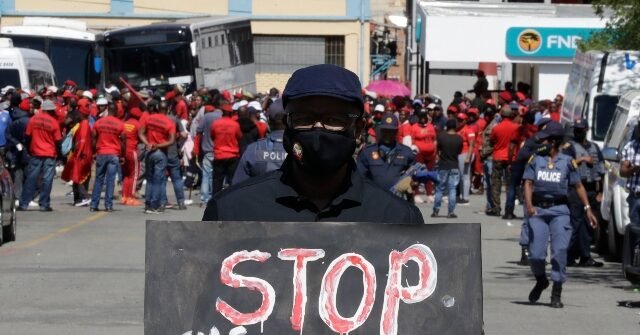South African President Cyril Ramaphosa on Monday defended his country’s new land expropriation law against criticism from President Donald Trump, who threatened to cut funding to the country over the legislation.
Trump announced on Sunday that all U.S. aid to South Africa could be suspended over a law signed by Ramaphosa last month that makes it easier for the government to expropriate land.
“South Africa is confiscating land, and treating certain classes of people VERY BADLY. It is a bad situation that the Radical Left Media doesn’t want to so much as mention,” Trump said on his Truth Social platform on Sunday.
“A massive Human Rights VIOLATION, at a minimum, is happening for all to see. The United States won’t stand for it, we will act. Also, I will be cutting off all future funding to South Africa until a full investigation of this situation has been completed!” he wrote.
Trump repeated these criticisms to reporters on Sunday night. “Terrible things are happening in South Africa. The leadership is doing some terrible things, horrible things,” he said.
“They’re taking away land, their confiscating land and actually they’re doing things that are perhaps far worse than that,” he said.
Ramaphosa’s office responded by defending the new expropriation law and promising safeguards were in place to prevent abuse.
“South Africa is a constitutional democracy that is deeply rooted in the rule of law, justice, and equality. The South African government has not confiscated any land,” the South African presidential office said.
“The recently adopted Expropriation Act is not a confiscation instrument, but a constitutionally mandated legal process that ensures public access to land in an equitable and just manner as guided by the constitution,” the statement continued.
“South Africa, like the United States of America and other countries, has always had expropriation laws that balance the need for public usage of land and the protection of rights of property owners,” the presidential statement said.
Ramaphosa’s African National Congress (ANC) accused Trump of spreading misinformation from a right-wing lobbyist group called “AfriForum.”
“President Trump’s recent tweet, echoing AfriForum’s false claims of ‘land confiscation,’ is a direct result of the lobby groups ongoing efforts to mislead the global community and protect apartheid-era land ownership patterns,” ANC Secretary-General Fikile Mbalula said on Monday.
“AfriForum has long positioned itself as a defender of white minority privilege, using fear-mongering to undermine South Africa’s constitutional and lawful land reform programme. Their campaign is not about justice but about blocking economic transformation and maintaining an oppressive status quo,” he charged.
Mbalula defended the Expropriation Act as “a fair, constitutional mechanism aimed at reversing historical land dispossession.”
“By weaponizing misinformation, they have emboldened some, who have no understanding of South Africa’s democratic processes but are quick to perpetuate racist narratives. It is unacceptable that AfriForum continues to seek external intervention against a sovereign country’s domestic policies – policies that are necessary to address the legacy of land dispossession caused by colonialism and apartheid,” he said.
The largest South African opposition party, the Democratic Alliance (DA), has been critical of some provisions of the Expropriation Act, but it insisted that the law signed by Ramaphosa does not allow “expropriation without compensation.”
Another major South African party, the far-left and openly racist Economic Freedom Fighters (EFF), jumped into the fray by insisting the Expropriation Act absolutely does allow arbitrary expropriation without compensation, and “no threat will stop us” from using it that way, should the EFF gain power.
The new South African law supersedes the Expropriation Act of 1975, which required the government to pay the owners of expropriated land. The revised law says land can be taken without compensation when the government feels it is “just and equitable and in the public interest.”
“Expropriation may not be exercised unless the expropriating authority has without success attempted to reach an agreement with the owner,” Ramaphosa’s spokesman Vincent Magewenya asserted.
The EFF obviously has a very expansive idea of what “just and equitable” property seizures would look like, and even the ANC complains that black South Africans do not own enough farmland three decades after the fall of apartheid – a situation they certainly seem to believe they can resolve with the forcible redistribution of property.
“The unequal distribution of land and the tendency by some greedy individuals to use land to impede the country’s development prospects will be a thing of the past,” Deputy Public Works and Infrastructure Minister Sihle Zikalala declared after the new Expropriation Act was signed into law.
Some of the Expropriation Act’s critics fear the government will not redistribute enough land, instead using its expanded powers to confiscate land the government desires for various projects, instead of giving farmland to black citizens.
Other critics worried the threat of arbitrary confiscation would scare off foreign investors – a peril that seems to have arrived early thanks to Trump’s comments, as the South African bond and stock markets slumped on Monday.
The new Expropriation Act has only been law for a few weeks, so much of the weekend’s debate was over how it could be abused. It was also unclear exactly which aid to South Africa might be suspended by Trump. The United States funds a plethora of programs in South Africa with a total value of about $440 million, covering everything from economic development to health programs.
Trump’s predecessor Joe Biden also considered funding cuts for South Africa, but for a different reason: the Biden administration was angry that Ramaphosa’s government was getting too close to Russia. The administration ultimately decided not to act on proposals to suspend foreign aid.
